Unit 6 Lesson 18 The Mystery Writer 教学设计2-优质公开课-北师大八下精品
(北师大版)义务教育课程标准实验教科书《英语》目录

(北师大版)义务教育课程标准实验教科书《英语》目录(北师大版)义务教育课程标准实验教科书《英语》目录七年级上册2013年7月第1版Unit 1 FamilyLesson 1 Photos of UsLesson 2 What Do They Look Like?Lesson 3 Happy Birthday!Unit 2 School LifeLesson 4 School ThingsLesson 5 Before ClassLesson 6 A School DayUnit 3 HomeLesson 7 Time to TidyLesson 8 Whose Ball Is This?Lesson 9 Near My HomeUnit 4 Interests and SkillsLesson 10 My InterestsLesson 11 A Skills SurveyLesson 12 China’s Got Talent七年级下册2013年12月第1版Unit 1 Daily LifeLesson 1 After SchoolLesson 2 A Dangerous JobLesson 3 Safety FirstUnit 2 On the WeekendLesson 4 Helping at HomeLesson 5 Talking to FriendsLesson 6 Going OutUnit 3 Food and DrinkLesson 7 Shopping for FoodLesson 8 At a RestaurantLesson 9 Food for SportUnit 4 Seasons and Weather Lesson 10 Weather in Beijing Lesson 11 Weather Around the World Lesson 12 Summer HolidayUnit 5 Now and ThenLesson 13 Changes in Our Town Lesson 14 My First DayLesson 15 My Favourite TeacherUnit 6 The Animal KingdomLesson 16 My Favourite Animal Lesson 17 Interesting Animals Lesson 18 An Animal Story八年级上册2014年7月第1版,2016年7月第3次印刷Unit 1 TelevisionLesson 1 Last Week on TVLesson 2 An Interview on TVLesson 3 The Big GameUnit 2 TeamsLesson 4 Class ProjectsLesson 5 TeamworkLesson 6 A Special TeamUnit 3 Faster, Higher, StrongerLesson 7 Time to ExerciseLesson 8 Olympic WinnersLesson 9 Never Give Up!Unit 4 Healthy LivingLesson 10 Going to the DoctorLesson 11 Health AdviceLesson 12 Healthy BonesUnit 5 HelpingLesson 13 Helping Your CommunityLesson 14 Helping Each OtherLesson 15 A Young HeroUnit 6 The UnexplainedLesson 16 Natural Abilities Lesson 17 True Stories?Lesson 18 Dreams八年级下册2014年12月第1版Unit 1 Technology and the Future Lesson 1 Schools of the Future Lesson 2 Online LifeLesson 3 Tomorrow's JobsUnit 2 CommunicationLesson 4 Animal TalkLesson 5 Meeting People Lesson 6 The Texting Generation Unit 3 Festivals and Holidays Lesson 7 Chinese New Year Lesson 8 A PicnicLes son 9 ThanksgivingUnit 4 Dealing with Problems Lesson 10 Problem PageLesson 11 Online TimeLesson 12 Generation GapUnit 5 MemoriesLesson 13 A Daughter's Letter Lesson 14 Grandpa's Memories Lesson 15 Life in the 1950sUnit 6 DetectivesLesson 16 A Detective Story(I)Lesson 17 A Detective Story(II)Lesson 18 The Mystery Writer九年级全一册2015年7月第1版Unit 1 LanguageLesson 1 Body LanguageLesson 2 Different Kinds of English Lesson 3 Language Learning Tips Unit 2 BooksLesson 4 ClsssicsLesson 5 The Book ClubLesson 6 Tom SawyerUnit 3 Festivals and Holidays Lesson 7 A Famous Inventor Lesson 8 Good or BadLes son 9 Creative MindsUnit 4 SpaceLesson 10 Life in SpaceLesson 11 The Amazing Shenzhou Lesson 12 The SpaceshipUnit 5 LiteratureLesson 13 Anne of Green Gables Lesson 14 The Dark Room Lesson 15 A Famous Story Writer Unit 6 Role ModelsLesson 16 Yao MingLesson 17 People in Our Lives Lesson 18 Steve JobsUnit 7 JourneysLesson 19 The Skil Road Lesson 20 Life Is a Journey Lesson 21 To the South PoleUnit 8 DkscoveriesLesson 22 Famous Discoveries Lesson 23 Discovery of ght Year Lesson 24 An Experiment Report Unit 6 Role ModelsLesson 25 Going GreenLesson 26 Our River Lesson 27 Tree Heroes。
北师大版英语八年级下册Unit 6单词及短语

Unit 6 DetectivesGetting Ready名词Nouns1. detective侦探,警探e.g.: A private detective had been tailing them for several weeks.2. degree(大学)学位;度数;程度e.g.: My brother has a master’s degree from Harvard.动词Verbs1. observe 观察e.g.: I felt he was observing everything I did.形容词Adjectives1. British 英国的;英国人的e.g.: Rowan Atkinson is a famous British actor.2. humorous滑稽有趣的,有幽默感的e.g.: He had a wide mouth and humorous grey eyes. Lesson 16 A Detective Story (I)名词Nouns1. solution解决方法e.g.: Attempts to find a solution have failed.2. clue线索e.g.: That was the clue which clinched it for us.3. mystery神秘的事物,谜e.g.: Their motives remain a mystery.4. setting(戏剧、小说等的)情节背景;环境e.g.: Our story has its setting in ancient Rome.5. hall门厅,走廊e.g.: Detective Winters walked into the hall.6. truth真相e.g.: The police have asked us to help them find the truth.7. parlour客厅e.g.: Is someone in the parlour?8. lord大人;阁下;领主e.g.: Actually sir, Lord Lister is dead.9. death死,死亡e.g.: Then suddenly, a week after his father’s death, he reappeared to claim his very valuable inheritance.10. inheritance遗产e.g.: She spent all her inheritance in a year.动词Verbs1. reappear 再次出现e.g.: She went upstairs and did not reappear until morning.2. claim索取,认领;宣称e.g.: A lot of lost property is never claimed.形容词Adjectives1. wise 充满智慧的e.g.: She had made a very wise decision.2. unclear不清楚的e.g.: His motives are unclear.3. dead死的e.g.: The poor child looks more dead than live.4. alive活着的,在世的e.g.: We don’t know whether he’s alive or dead.5. valuable贵重的;宝贵的e.g.: The book provides valuable information on recent trends.6. impossible不可能的e.g.: It’s impossible for me to be there before eight.副词Adverbs1. recently 最近e.g.: We received a letter from him recently.2. exactly确切地;准确地e.g.: The police have tried their best but it’s impossible for them to know exactly what’s going on.连词Conjunctions1. whether 是否e.g.: He seemed undecided whether to go or stay.代词Pronouns1. nobody 没人e.g.: Nobody knew where he was or whether he was alive.兼类词Words with Multiple Part of Speech1. least adv.最少n.最小的;最少的e.g.: She never had the least idea what to do about it.2. doubt n.疑惑,疑问v.怀疑e.g.: There is some doubt about the best way to do it.短语Expressions1. detective story 侦探小说e.g.: He spent the whole afternoon reading a detective story.2. at least至少e.g.: It takes at least an hour to get home from work.3. pass away过世;逝世e.g.: He passed away recently and his son is the work.Lesson 17 A Detective Story (II)名词Nouns1. sleeve袖子e.g.: The sleeves are tight to the elbow, then flare out.2. silk丝绸;蚕丝e.g.: Her skin was as smooth as silk.3. evidence证据,证明e.g.: What other evidence can you find from Daniel Lister’s answers?形容词Adjectives1. thirsty 渴的e.g.: We were hungry and thirsty.副词Adverbs1. ahead 向前面;提早e.g.: I’ll run ahead and warn them.2. sadly不幸地e.g.: Sadly, after eight years of marriage they had grown apart.短语Expressions1. a little 少量,一些e.g.: I have a little money in the bank to fall back on.Lesson 18 The Mystery Writer名词Nouns1. actress女演员e.g.: After more than 24,000 shows, actors, and actress still perform it there today.2. pupil学生,(尤指)小学生e.g.: Although she was never a pupil in a classroom, by age five, she learned to read byherself.3. education教育e.g.: With this kind of education, it is no wonder she became such a fantastic mystery writer.4. intelligence智力,才智e.g.: She uses her intelligence, her knowledge of human nature and memories of local history to discover the truth.5. crime犯罪活动;罪行e.g.: She often beats the police by solving crimes before they do.6. career生涯,职业e.g.: She had a long and very active career before she died in 1976.7. sales销售量e.g.: The newspaper has sales of 1.72 million.8. fiction小说;虚构的事e.g.: I like reading science fiction.动词Verbs1. create 创作;创造e.g.: Which famous detective characters did she create?2. translate 翻译e.g.: Her books have been translated into 103 languages.3. perform表演e.g.: The play was first performed in 1987.4. print印刷;打印e.g.: Even now, her books are still printed, her sales are strong and people still know her name.形容词Adjectives1. wealthy 富有的,富裕的e.g.: She is most famous for her very popular detective stories which made her wealthy.2. guilty 犯罪的;感到内疚的e.g.: He believes that guilty people always show themselves.副词Adverbs1. cleverly 聪明地e.g.: Readers must pay close attention while reading her stories and she very cleverly made each one difficult to solve.数词Numbers1. billion 十亿e.g.: She has sold more than two billion books.兼类词Words with Multiple Part of Speech1. fear n., v.惧怕e.g.: She seems to be a sweet, shy, old lady, but she actually has no fear.短语Expressions1. the West End of London 伦敦西区e.g.: It started in the West End of London in 1952.Communication Workshop名词Nouns1. dressmaker(女装)裁缝e.g.: In the story, Miss Politt, the dressmaker, finds that Mrs Spenlow is dead in her house in a small village called St Mary Mead.2. murderer杀人凶手e.g.: Everybody, including the police, thinks that Mr Spenlow is the murderer.3. pin胸针e.g.: The best part of the story is when Miss Marple explains how she solves the mystery by noticing a tiny pin on a policeman’s uniform.4. policeman(男)警察e.g.: I think she is very special because she is just an old lady but she is even smarter than the policemen.5. heroine女主人公;女英雄e.g.: I never thought that an old lady could be heroine of a detective story!6. ending结尾;结局e.g.: You will enjoy the story very much because the ending is so surprising.7. case案件e.g.: This case brings into question the whole purpose of the law.形容词Adjectives1. calm 镇静的;沉着的e.g.: He is so calm and quiet after discovering his wife’s death.2. surprising令人吃惊的e.g.: We had a surprising amount in common.兼类词Words with Multiple Part of Speech1. murder n., v.谋杀e.g.: Tape-Treasure Murder is a short story by Agatha Christie.。
北师大版英语八下Unit 6《Lesson 18 The Mystery Writer》(第1课时)ppt课件
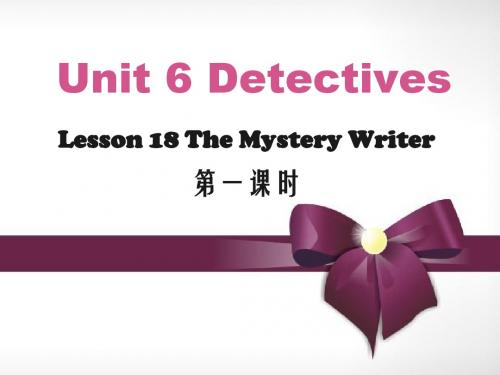
v. 翻译
103 languages 24,000 shows two billion
n. 女演员
Actors and actresses perform one of her play on more than 24,000 shows
v. 表演
103 languages 24,000 shows two billion
Introduce Agatha Christie
Agatha Christie
by age 5
She _______ by herself. She ________ the piano and _____ the music. Her father ______ with problems.
in 1920
in 1920
Her ______ came out.
in 1952
_______ started in the West End of London.
in 1973 at the age of 82
She wrote _________.
in 1976
ill_____. Her sales are______
She has sold more than 2 billion books.
Her sales are more than 2 billion books.
n. 销售量
103 languages 24,000 shows two billion
Do you think the writer is popular?
played She ________ the piano loved the music. and _____ taught her maths Her father ____________ with problems.
北师大版八年级英语上册课件:Unit 6 The Unexplaineams 第1课时
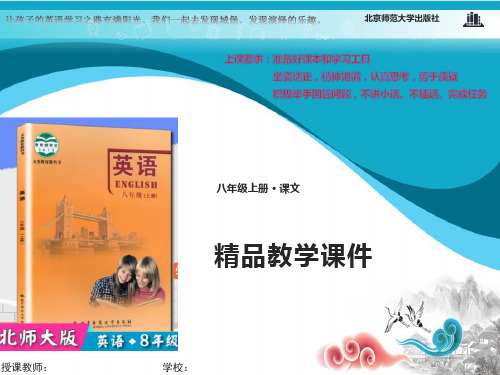
授课教师:
八年级上册 · 课文
精品教学课件
学校:
Unit 6 The unexplained
Lesson 18 Dreams
(第一课时)
What do you often dream about?
pyjamas
睡衣裤
Our brains are active when we are asleep.
Where does an interviewer work
TV station
radio station
无线广播电台
If you are the interviewer, what questions do you want to ask?
Listen and write T or F
1. Scientists know why we dream. 2. Some people never dream. 3. We don’t remember every dream. 4. Animals never dream. 5. People have some common dreams.
Homework
1.跟录音朗读听力材料。 2.写出采访报道。 3.调查班里同学的常见梦境。
感谢聆听
大脑
睡着的
listen and find out the answer
Who are talking about dreams?
listen and find out the answer
Who are talking?
a) Two friends are talking. b) A teacher is talking to a student. c) An interviewer is talking to a scientist.
北师大版八年级英语上册:Unit 6 Lesson 18 Dreams 教案

Unit 6 The unexplained
Lesson 18 Dreams
【第一课时】
【学习目标】
在本课学习结束时,学生能够:
1.通过听,找出并归纳有关人们做梦的原因、普遍性以及梦境的内容等相关的信息。
了解做梦相关的科学知识。
2.认读并说出与做梦话题有关的词汇。
3.依据所获取的信息和语言知识,口头描述学到的有关做梦的知识。
4.逐步培养对神秘事物探索的兴趣。
【学习重点】
学生能够通过听找出并归纳有关人们做梦的原因、普遍性以及梦境的内容等相关的信息。
了解做梦相关的科学知识。
【学习难点】
学生能够通过听找出并归纳有关人们做梦的原因、普遍性以及梦境的内容等相关的信息。
了解做梦相关的科学知识。
【学习内容】。
新视野大学英语第二册读写教程unit6

Intensive Study
6 Though most of us would like to think ourselves free from such prejudiced notions, we’re all guilty of name stereotyping to some extent. Confess: wouldn’t you be surprised to meet a carpenter named Nigel? A physicist called Bertha? A Pope Mel? Often, we project name-based stereotypes on people, as one woman friend discovered while taking charge of a nursery-school’s group of fouryear-olds. “There I was, trying to get a little active boy named Julian to sit quietly and read a book – and pushing a thoughtful creature named Rory to play ball. I had their personalities confused because of their names!”
Intensive Study
3 Naturally, the name change didn’t cause Debbie/Lynne’s professional achievement – but it surely helped if only by adding a bit of self-confidence to her talents. Social scientists say that what you’re called can affect your life. Throughout history, names have not merely identified people but also described them. “… As his name is, so is he…” says the Bible, and Webster’s Dictionary includes the following definition of name: “a word or words expressing some quality considered characteristic or descriptive of a person or a thing, often expressing approval or disapproval”. Note well “approval or disapproval”. For better or worse, qualities such as friendliness or reserve, plainness or charm may be suggested by your name and conveyed to other people before they even meet you.
北师大版英语八下Unit6Lesson18TheMysteryWriter(第2课时)说课稿
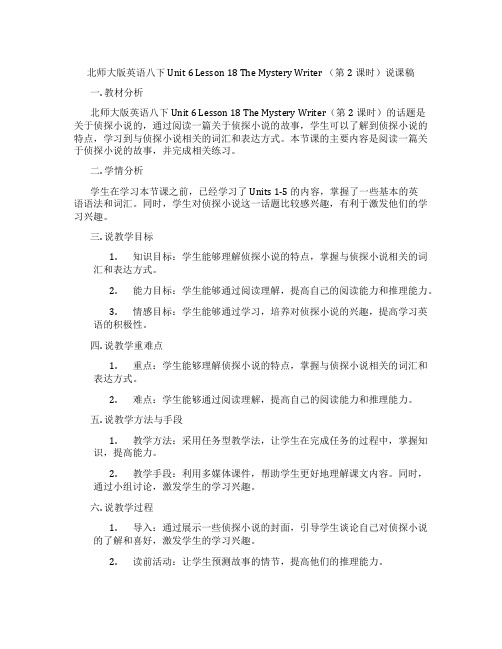
北师大版英语八下Unit 6 Lesson 18 The Mystery Writer (第2课时)说课稿一. 教材分析北师大版英语八下Unit 6 Lesson 18 The Mystery Writer(第2课时)的话题是关于侦探小说的,通过阅读一篇关于侦探小说的故事,学生可以了解到侦探小说的特点,学习到与侦探小说相关的词汇和表达方式。
本节课的主要内容是阅读一篇关于侦探小说的故事,并完成相关练习。
二. 学情分析学生在学习本节课之前,已经学习了 Units 1-5 的内容,掌握了一些基本的英语语法和词汇。
同时,学生对侦探小说这一话题比较感兴趣,有利于激发他们的学习兴趣。
三. 说教学目标1.知识目标:学生能够理解侦探小说的特点,掌握与侦探小说相关的词汇和表达方式。
2.能力目标:学生能够通过阅读理解,提高自己的阅读能力和推理能力。
3.情感目标:学生能够通过学习,培养对侦探小说的兴趣,提高学习英语的积极性。
四. 说教学重难点1.重点:学生能够理解侦探小说的特点,掌握与侦探小说相关的词汇和表达方式。
2.难点:学生能够通过阅读理解,提高自己的阅读能力和推理能力。
五. 说教学方法与手段1.教学方法:采用任务型教学法,让学生在完成任务的过程中,掌握知识,提高能力。
2.教学手段:利用多媒体课件,帮助学生更好地理解课文内容。
同时,通过小组讨论,激发学生的学习兴趣。
六. 说教学过程1.导入:通过展示一些侦探小说的封面,引导学生谈论自己对侦探小说的了解和喜好,激发学生的学习兴趣。
2.读前活动:让学生预测故事的情节,提高他们的推理能力。
3.阅读理解:学生阅读课文,回答相关问题,检查学生对课文内容的理解。
4.词汇学习:学生通过课文,学习与侦探小说相关的词汇和表达方式。
5.课堂讨论:学生分组讨论,分享自己对侦探小说的看法,培养学生的表达能力。
6.课后作业:学生完成课后练习,巩固所学知识。
七. 说板书设计板书设计主要包括课题、重点词汇和表达方式,以及课堂讨论的要点。
六年级上册英语教案UnitFiveLesson18北京版

六年级上册英语教案 Unit Five Lesson 18 北京版教学内容本课为北京版六年级上册英语第18课,教学内容围绕“日常生活中的简单英语会话”展开。
课程主要包括对家庭、学校、朋友、爱好等话题的英语表达。
学生将学习如何使用基本的英语句型来描述日常生活,并通过听力、口语、阅读、写作等四项技能的训练,提升英语综合运用能力。
教学目标1. 知识与技能:学生能够掌握并正确运用本课的关键词汇和句型,如“family”, “school”, “friend”, “hob”等。
2. 过程与方法:通过小组讨论、角色扮演等互动形式,学生能够提高英语口语交流能力,并能在实际情境中灵活运用所学知识。
3. 情感态度价值观:激发学生对英语学习的兴趣,培养他们跨国文化交流的意识。
教学难点1. 词汇记忆:本课涉及的新词汇较多,学生需要通过有效的记忆方法掌握。
2. 句型应用:如何引导学生正确、灵活地运用所学句型进行真实语境下的对话是教学的难点。
教具学具准备1. 教具:多媒体教学设备、单词卡片、课程PPT。
2. 学具:英语课本、笔记本、彩色笔。
教学过程1. 导入:利用PPT展示与主题相关的图片,引导学生用英语描述,激活学生的背景知识。
2. 新授:通过单词卡片和PPT介绍新词汇,配合例句解释词汇用法,让学生跟读并模仿。
3. 实践:分组进行角色扮演,模拟真实生活场景,使用本课所学句型和词汇进行对话练习。
4. 巩固:完成课本上的练习题,教师巡回指导,及时纠正发音和用法错误。
板书设计板书将简洁明了地列出本课的关键词汇、重要句型以及相关的语法点。
通过颜色和图示的辅助,使板书内容直观易懂,便于学生记录和复习。
作业设计1. 书面作业:完成课后练习题,巩固词汇和句型。
2. 口头作业:学生需在家中与家长进行英语对话,练习本课所学内容。
课后反思重点细节:教学难点教学难点详细补充和说明教学难点是教学过程中的关键环节,它们通常是学生在学习过程中遇到的最大障碍,需要教师重点关注和精心设计教学策略来克服。
Unit 6 Lesson 18 The Mystery Writer 教案 (2)
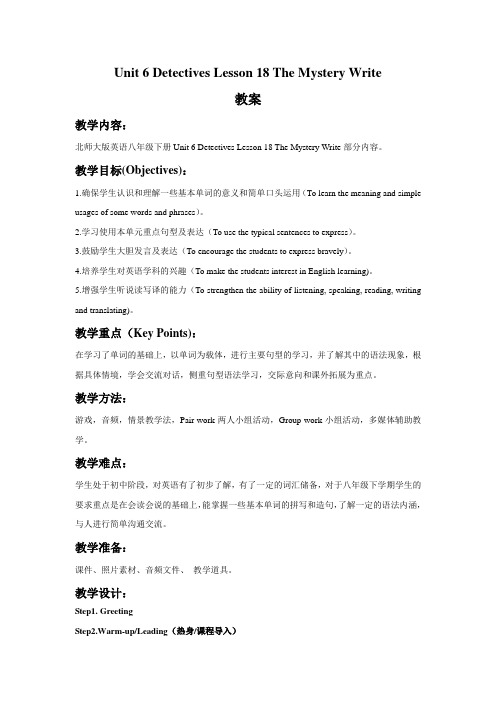
Unit 6 Detectives Lesson 18 The Mystery Write教案教学内容:北师大版英语八年级下册Unit 6 Detectives Lesson 18 The Mystery Write部分内容。
教学目标(Objectives):1.确保学生认识和理解一些基本单词的意义和简单口头运用(To learn the meaning and simple usages of some words and phrases)。
2.学习使用本单元重点句型及表达(To use the typical sentences to express)。
3.鼓励学生大胆发言及表达(To encourage the students to express bravely)。
4.培养学生对英语学科的兴趣(To make the students interest in English learning)。
5.增强学生听说读写译的能力(To strengthen the ability of listening, speaking, reading, writing and translating)。
教学重点(Key Points):在学习了单词的基础上,以单词为载体,进行主要句型的学习,并了解其中的语法现象,根据具体情境,学会交流对话,侧重句型语法学习,交际意向和课外拓展为重点。
教学方法:游戏,音频,情景教学法,Pair-work两人小组活动,Group-work小组活动,多媒体辅助教学。
教学难点:学生处于初中阶段,对英语有了初步了解,有了一定的词汇储备,对于八年级下学期学生的要求重点是在会读会说的基础上,能掌握一些基本单词的拼写和造句,了解一定的语法内涵,与人进行简单沟通交流。
教学准备:课件、照片素材、音频文件、教学道具。
教学设计:Step1. GreetingStep2.Warm-up/Leading(热身/课程导入)Warm-up Questions:Do you remember this writer from page 65?Which famous detective characters did she create?...Step3.Presentation(呈现新课)1.Words Learning!1)老师放映课件,用中文询问同学看到了什么?同学们会看到课件上呈现的图画。
北师大版英语八年级下册Unit 6 Lesson 18 The Mystery Writer 教学设计1

Unit 6 Lesson 18 The Mystery Writer 教学设计教学内容分析本课是北师大版《初中英语》八年级下册教材Unit6 Lesson18,作为本单元的第三课时,基于本单元Detectives的话题,本课介绍了英国著名女侦探小说家Agatha Christie一生的主要成就以及她塑造的主要人物。
帮助学生了解Agatha Christie这位高产作家,激发学生课后去阅读其作品的兴趣。
本课为人物传记,主要介绍了两点的内容:Agatha Christie写作上的成就以及她塑造的两个典型的人物:侦探Hercule Poirot 和侦探 Miss Marple。
在阅读教学中,可以帮学生梳理出两条脉络,一条是根据时间顺序,引导学生了解Agatha Christie一生的成就; 另外一条是其塑造的两名侦探,引导学生发现其塑造不同人物的特点。
因为本课文章较长,内容对学生来说不容易,而且没有语法内容,所以本课的教学设计将分为两个课时。
第一课时主要依据第一条脉络。
重点让学提取出Agatha Christie一生在写作上的成就,本课难点是让学生可以总结出Agatha Christie是什么样的人。
并为学生推荐Agatha Christie相关作品。
本课共有16个生词:其中要求掌握的有create, translate,, actress,wealthy, pupil,education, cleverly, fear, print, sales 共10个,要求理解的有billion, perform, guilty, intelligence, crime, career 共6个。
其中actress, sales,billion,perform可能会影响学生理解文章,进行读前处理,其余词汇在阅读过程通过构词法、上下文让学生理解,或者在读中处理其余生词。
同时,在阅读过程中还会渗透阅读策略:在阅读中找到指示代词所指代的人或物的技巧。
Unit 6 Lesson 18 The Mystery Writer 教案
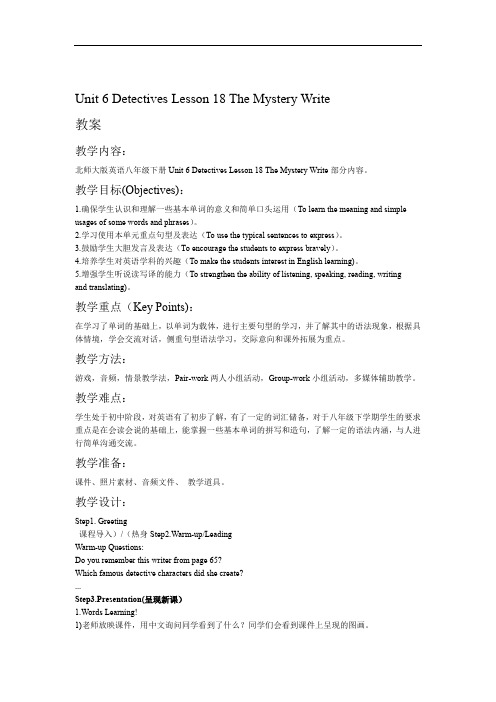
Unit 6 Detectives Lesson 18 The Mystery Write教案教学内容:北师大版英语八年级下册Unit 6 Detectives Lesson 18 The Mystery Write部分内容。
教学目标(Objectives):1.确保学生认识和理解一些基本单词的意义和简单口头运用(To learn the meaning and simple usages of some words and phrases)。
2.学习使用本单元重点句型及表达(To use the typical sentences to express)。
3.鼓励学生大胆发言及表达(To encourage the students to express bravely)。
4.培养学生对英语学科的兴趣(To make the students interest in English learning)。
5.增强学生听说读写译的能力(To strengthen the ability of listening, speaking, reading, writing and translating)。
教学重点(Key Points):在学习了单词的基础上,以单词为载体,进行主要句型的学习,并了解其中的语法现象,根据具体情境,学会交流对话,侧重句型语法学习,交际意向和课外拓展为重点。
教学方法:游戏,音频,情景教学法,Pair-work两人小组活动,Group-work小组活动,多媒体辅助教学。
教学难点:学生处于初中阶段,对英语有了初步了解,有了一定的词汇储备,对于八年级下学期学生的要求重点是在会读会说的基础上,能掌握一些基本单词的拼写和造句,了解一定的语法内涵,与人进行简单沟通交流。
教学准备:课件、照片素材、音频文件、教学道具。
教学设计:Step1. Greeting课程导入)/(热身Step2.Warm-up/LeadingWarm-up Questions:Do you remember this writer from page 65?Which famous detective characters did she create?...Step3.Presentation(呈现新课)1.Words Learning!1)老师放映课件,用中文询问同学看到了什么?同学们会看到课件上呈现的图画。
九年级英语全册Unit6RolemodelsLesson18SteveJobs教案新版北师大版_

Unit 6 Role modelsLesson 18 Steve Jobs本课Lesson18的主题是成功人士如何获得成功。
本文是一篇关于Steve Jobs的人物传记类文章。
文章首先介绍了Steve Jobs是何许人-----他是当今世界最具价值的苹果公司的合作创始人,他创造了当今世界无数人日常生活都离不开的众多电子产品。
紧接着作者分三个段落围绕他的早年生活和教育经历、早期工作和之后的成就、他的性格及与人相处的方式等三个方面讲述了他的生平,最后是作者对他的评价。
【知识目标】通过阅读获取有关Steve Jobs性格两面性的事例信息。
【能力目标】通过阅读获取有关Steve Jobs生平信息,完成有关其早期经历、性格和成就的表格。
【情感目标】通过辩论“Steve Jobs是否是青少年的模范”,体会并逐步形成坚持、不放弃的品质。
【教学重点】通过阅读获取信息,完成有关Steve Jobs早期经历、性格和成就的表格。
【教学难点】根据获取的信息和语言,归纳总结出Steve Jobs坚持、不放弃的性格是促成他成功的根本原因。
1. 课前准备:调试光盘与课件、给学生分组、为学生布置预习作业等;2. 教具学具:光盘、大卡片等。
Step1. Warm-up1. LookatSteve Jobs’ photos and let students talk about their knowledge of Jobs.2. Introduce Steve Jobs’ inventions and achievements.Step2. Reading1. Skim the text. Match the headings with the correct paragraphs.2. Scan the whole passage and fill in the blanks to complete his information.3. After reading, get students to discuss the following questions in the slide.4. Highlight the verbs describing events.Step3. Consolidation1.Ask students give their opinions on these issues.Would you like to work with people like Steve Jobs?Why or why not?Was Steve Jobs a perfect man?2. Find out the examples and reasons to support the points.。
北师大版英语八下Unit 6 Lesson 18 The Mystery Writer (第2课时)

北师大版英语八下Unit 6 Lesson 18 The Mystery Writer (第2课时)教学设计一. 教材分析北师大版英语八下Unit 6 Lesson 18《The Mystery Writer(第2课时)》主要讲述了侦探小说的特点以及一位著名的侦探小说作家阿加莎·克里斯蒂。
本节课的重点是让学生能够掌握相关词汇和句型,如:detective story, mysterious, plot, surprise ending等,并能够运用这些词汇和句型进行口语交流和写作。
同时,本节课还要求学生能够理解文章的主旨大意,把握人物关系,提高阅读理解能力。
二. 学情分析八年级的学生已经具备了一定的英语基础,对于侦探小说这一题材较为感兴趣。
但部分学生在口语表达和写作方面还存在一定的困难,需要教师在课堂上给予更多的关注和指导。
三. 教学目标1.知识目标:学生能够掌握与侦探小说相关的词汇和句型,如:detective story, mysterious, plot, surprise ending等。
学生能够理解文章的主旨大意,把握人物关系。
2.能力目标:学生能够运用所学的词汇和句型进行口语交流和写作。
学生能够提高阅读理解能力。
3.情感目标:学生能够培养对侦探小说的兴趣,激发学习英语的热情。
四. 教学重难点学生能够掌握与侦探小说相关的词汇和句型。
学生能够理解文章的主旨大意,把握人物关系。
学生能够运用所学的词汇和句型进行口语交流和写作。
学生能够提高阅读理解能力。
五. 教学方法1.情境教学法:通过设定情境,让学生在实际语境中运用所学知识。
2.任务型教学法:通过完成任务,培养学生的主体参与意识和合作精神。
3.交际法:通过师生互动、生生互动,提高学生的口语表达能力。
六. 教学准备1.教师准备:提前准备好与课程相关的侦探小说素材、图片等教学资源。
设计好相关的教学活动和任务。
2.学生准备:预习相关词汇和句型,了解侦探小说的基本知识。
北师大版英语八下Unit 6 Lesson 18 The Mystery Writer (第1课时)

北师大版英语八下Unit 6 Lesson 18 The Mystery Writer (第1课时)教学设计一. 教材分析北师大版英语八下Unit 6 Lesson 18《The Mystery Writer》主要讲述了一位神秘作家如何创作悬疑小说的故事。
通过阅读文本,学生可以了解到悬疑小说的特点,以及作家在创作过程中的思考。
本节课主要涉及到一般过去时的运用,以及与悬疑小说相关的词汇和短语。
二. 学情分析考虑到学生已经掌握了如何运用一般过去时描述过去的事情,本节课的主要任务是引导学生运用所学知识,理解并表达关于悬疑小说的相关内容。
同时,学生需要通过阅读和听力练习,提高自己的理解能力和推测能力。
三. 教学目标1.知识目标:–能够理解并运用一般过去时描述过去的事件。
–掌握与悬疑小说相关的词汇和短语。
2.技能目标:–能够通过阅读和听力练习,理解故事内容,提高阅读理解能力。
–能够运用所学知识,进行口语表达和写作。
3.情感目标:–培养学生的推测能力和好奇心。
–激发学生对悬疑小说的兴趣。
四. 教学重难点•运用一般过去时描述过去的事件。
•掌握与悬疑小说相关的词汇和短语。
•理解并运用句子结构“How do you like…?”进行询问。
•正确运用一般过去时进行描述。
五. 教学方法1.任务型教学法:通过完成各种任务,让学生在实践中学习和运用语言。
2.情境教学法:创设真实的情境,让学生在特定的环境中学习和运用语言。
3.交际法:通过小组讨论和角色扮演等方式,培养学生的口语表达能力。
六. 教学准备1.教学材料:教材、多媒体课件、录音机、磁带。
2.教学环境:教室内的座位安排成小组讨论的形式。
七. 教学过程1.导入(5分钟)–教师通过提问方式,引导学生回顾一般过去时的用法。
–学生自由讨论并回答问题。
2.呈现(10分钟)–教师播放课文录音,让学生边听边跟读。
–教师通过幻灯片呈现课文内容,并进行讲解。
3.操练(10分钟)–教师学生进行小组讨论,讨论悬疑小说的特点。
初二英语(师大版)-U6 Lesson 18 The Mystery Writer 2-1教案

Q2.Who’s your favorite author?
Homework
1. Read aloud the passage on P70.
2. Talk about your favorite books and author with your partner.
2.复习与巩固代词的用法和指代关系;
3.能够描述自己喜欢的书或故事,介绍自己最喜爱的作家。
教学重点:
复习与巩固代词的用法和指代关系;
教学难点:
能够描述自己喜欢的书或故事,介绍自己最喜爱的作家。
教学过程(表格描述)
教学环节
主要教学活动
设置意图
Review
Vocabulary exercise
LanguageFocus
Speaking
Homework
T leads the Ss to read the article of this lesson.
Tshowsvocabulary of thislessonand asks Ss to readthewords out loud.
Tleads theSs todo the exercise of vocabulary and check the answers later.
复习本课的文本内容和话题词汇。
复习并巩固本课词汇。
复习代词和代词的指代关系,进一步巩固所学。
口头输出练习,加强对目标语言点的操练。
T leads the Ss to read the pronouns together.
T asks the Ss to do exercise aboutpronounsand check the answers.
Unit 6 Lesson 18 第2课时教学设计
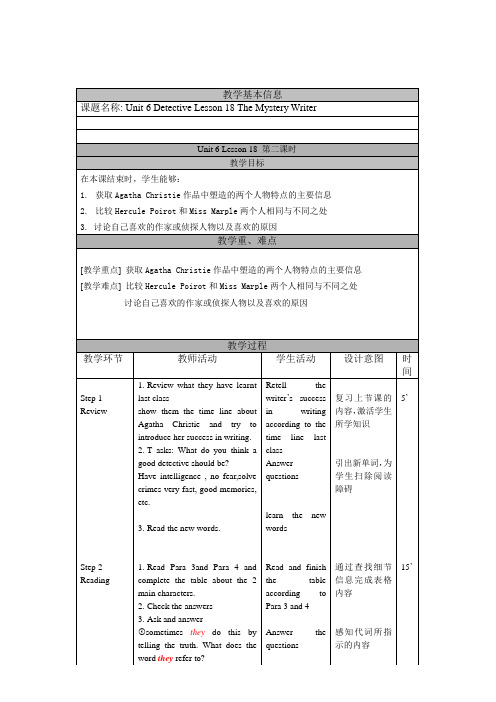
learn the new words
Read and finish the table according to Para 3 and 4
Answer the questions
Conclude the ways to find what pronouns refer to
Watch a movie about Detective Herclue Poirot or Miss Marple. And try to enjoy Agatha’s work
Retell the writer’s success in writing according to the time line last class
Discuss with partner and share your answer.
Finish the table and discuss with partners
Write down the books’or the stories’name and can read them after class
鼓励学生课下去了解这个作者和其作品,鼓励学生阅读
5’
15’
5’
8’
10’
2’
板书设计
Unit6 DetectivesLesson 18The Mystery Writer
in 1973at the age of 82
in 1976now
in 1952
by age 5
in 1920
new words:
She often beats the police by solving crimes beforetheydo. What does the wordtheyrefer to?
八年级英语下册Unit6Lesson18TheMysteryWriter课件新版北师大版
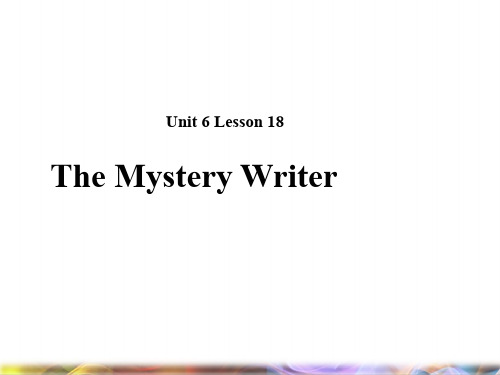
Shele_a_rn_e_d_t_o_re_a_d by herself. She ___p_la_y_ed__ the piano and _l_o_ve_d_ the music. Her father __ta_u_gh_t_h_e_r_m_a_th_s with problems.
Reading
in 1976 She __d_ie_d___.
now Her books are still__pr_in_te_d _ Her sales are____str_on_g
People still__k_no_w_h_er_n_ame
The newspapers are printed and sold to us every day.
Discuss:
Concluding
If we want to know what pronoun refers to, we need to read the sentences backwards.
Finish the EX. 7 on Page 31 on the book
Discuss:
Para. 2
Agatha's books and plays are popular.
Para. 3
Agatha learned at home and became a fantastic writer.
Para. 4
ห้องสมุดไป่ตู้
Introduce detective Hercule Poirot.
Para. 5
Unit 6 Lesson 18
The Mystery Writer
Warm-up
The writer
- 1、下载文档前请自行甄别文档内容的完整性,平台不提供额外的编辑、内容补充、找答案等附加服务。
- 2、"仅部分预览"的文档,不可在线预览部分如存在完整性等问题,可反馈申请退款(可完整预览的文档不适用该条件!)。
- 3、如文档侵犯您的权益,请联系客服反馈,我们会尽快为您处理(人工客服工作时间:9:00-18:30)。
Unit 6 Lesson 18 The Mystery Writer 教学设计Teaching aims:
1. 通过创设一些情境让学生了解Agatha Christie著名作家,在此过程提升学生的口语表达水平。
2. 让学生进行对话练习,介绍
英国著名女侦探小说家Agatha Christie一生的主要成就以及她塑造的主要人物
3. 通过阅读课文思考并讨论Agatha是一个什么样的人。
Key points:
获取文章各段段意以及作家Agatha Christie一生的成就的信息。
Difficult points:
引导学生在活动中、生活中灵活运用句型,培养学生英语口语的能力。
Teaching preparations:
PPT, cards, pictures.
Teaching procedures:
Step 1: Warm-up
Do you remember this writer from page 65?
Which famous detective characters did she create?
Step 2: Reading
She has sold more than two billion books and her books have been translated into 103 languages. Her play, The Mousetrap, has run longer than any other play. It started in the West End of London in 1952. After more than 24000 shows, actors and actresses still perform it there today. She is most famous for her very popular detective stories which made her wealthy. Her name is Agatha Christie.
…
1st Reading Read and match
2nd Reading Read and complete the time line.
Introduce Agatha Christie
Readers must pay close attention while reading Agatha's stories. Do you know why?
Listen to the tape, and check your answer from above. Then read aloud the text!
Step 3: Speaking (pair work)
Pair-work
What kind of stories or books do you want to read? Who's your favourite author? Talk to your partner.
Example
A: I like reading science fiction.
B: Why do you like reading these kinds of books?
A: Because I enjoy stories about people in imaginary words of the future.
B: Who's your favorite science fiction writer?
A: Isaac Asimov. I can lend you one of his books.
B: Great, thanks!
Talk with your partners on this topic and introduce the main plot of the book.
Step 4: Homework
Write a short passage about:
1. What kind of stories or books do you like reading?And why?
2. Who is your favorite author? And why?。
